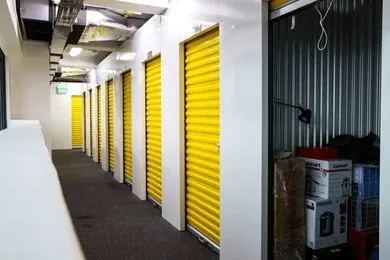In today’s fast-paced world, the demand for reliable and efficient storage solutions is at an all-time high. Whether you’re managing personal belongings, business inventory, or critical data, choosing the right storage solution is essential for long-term success and convenience. One of the key decisions you’ll face is whether to opt for long-term or short-term storage. In this blog, we’ll break down the differences between these two options, helping you make an informed decision that aligns with your unique needs.
Understanding Long-Term Storage Solutions
Long-term storage is typically defined as storage that is intended to be used for extended periods, often for years. This type of storage is ideal for items or data that do not require frequent access but still need to be preserved securely. Long-term storage is often associated with bulk storage solutions, such as those used in industries like energy and data management.
Common Technologies Used in Long-Term Storage
There are several technologies that support long-term storage solutions, especially in the context of energy and data. For energy storage, one of the most common options is lithium-ion batteries, which are favored for their high energy density, longevity, and relatively low maintenance. However, these batteries come with limitations such as cost and environmental concerns.
Compressed Air Energy Storage (CAES) is another innovative solution. It works by storing energy in the form of compressed air, which is then released to generate power when needed. CAES is highly effective in managing large-scale energy storage requirements, especially in renewable energy applications.
Pumped Hydro Storage operates by using excess energy to pump water to an elevated reservoir. The water is released to drive turbines when energy demand spikes. This method is widely used for large-scale energy management.
Supercapacitors, which store energy electrostatically rather than chemically, offer long cycle lives, making them ideal for applications that require frequent charge and discharge cycles, such as in transportation and grid stabilization.
Benefits of Long-Term Storage Solutions
Long-term storage solutions come with a range of benefits that make them attractive to industries and individuals alike. One of the primary advantages is reliability. Whether it’s for preserving data over decades or storing energy for future use, long-term storage systems provide consistent performance with minimal intervention.
Another significant benefit is cost-effectiveness, especially for bulk storage needs. For example, in renewable energy storage, long-term solutions help integrate intermittent energy sources like solar and wind by storing excess power generated during off-peak times.
Understanding Short-Term Storage Solutions
On the other hand, short-term storage is designed to meet more immediate needs. It typically involves storage solutions that are used for hours, days, or weeks, rather than months or years. Short-term storage is essential when there is a need for quick access to stored items or data.
Key Technologies Used in Short-Term Storage
Flywheels are one of the most well-known technologies used in short-term storage. These devices store energy kinetically by spinning at high speeds. Flywheels provide a quick response to changes in power demand and are often used in applications like backup power and frequency regulation on the grid.
Short-term storage solutions are also useful in contexts like temporary data backup or inventory management for businesses that deal with fast-moving goods.
Advantages of Short-Term Storage Solutions
One of the major advantages of short-term storage is flexibility. These solutions allow users to quickly adjust to varying power or storage demands. This flexibility is essential in situations where demand spikes unexpectedly or when rapid adjustments are necessary.
Additionally, short-term storage offers fast response times, which is crucial in industries that require immediate action. For example, during power outages or emergencies, short-term storage systems can quickly supply backup power, ensuring that critical systems remain operational.
Key Considerations When Choosing Between Long-Term and Short-Term Storage Solutions
When deciding between long-term and short-term storage solutions, several factors must be considered. These include:
- Data growth or inventory needs: For businesses dealing with rapid expansion, long-term storage may be required to handle large volumes of data or goods. However, if only temporary storage is needed, short-term solutions may suffice.
- Budget constraints: Long-term storage solutions typically require a higher upfront investment, while short-term options are often more affordable in the short run.
- System criticality: For industries dealing with mission-critical systems, the speed and reliability of storage solutions will heavily influence the decision. In these cases, short-term storage with fast response times may be the better choice.
Comparing Long-Term vs. Short-Term Storage Solutions: Capacity, Reliability, and Maintenance Needs
When evaluating storage solutions, it’s essential to consider factors such as capacity, reliability, and maintenance needs. Long-term storage systems often require larger capacities and more frequent maintenance to ensure optimal performance over time. In contrast, short-term storage systems typically have lower capacities but need to provide immediate results.
Long-term storage solutions tend to have lower maintenance costs over time due to the nature of their storage technologies, while short-term systems may require more frequent monitoring and upkeep to maintain their responsiveness.
Making the Right Choice For Your Needs
Choosing between long-term and short-term storage solutions comes down to understanding your specific requirements. Are you storing data that needs to be accessed infrequently over a long period, or are you managing fluctuating power demands that require quick responses? Evaluating these factors carefully will help you make an informed decision tailored to your unique needs.
Whether you choose long-term storage for its reliability and cost-effectiveness or short-term storage for its speed and flexibility, it’s crucial to partner with experts who can guide you through the selection process.
For businesses seeking storage solutions, we recommend visiting Village Movers & Storage to explore their comprehensive offerings. Whether you need temporary or long-term storage, they provide the expertise and resources to help you make the right choice for your needs.
For more information on storage options, check out Village Movers & Storage’s storage solutions.




